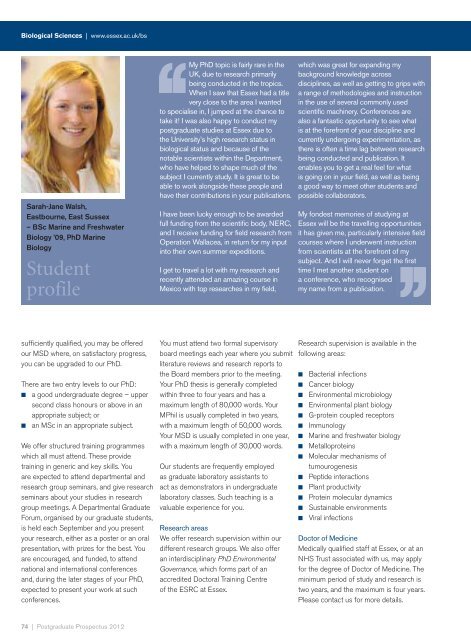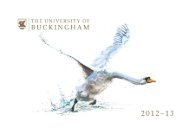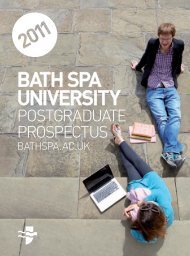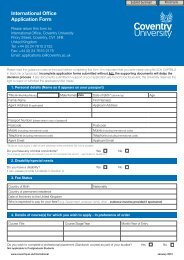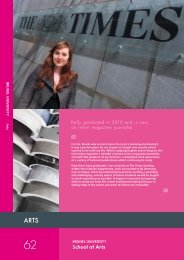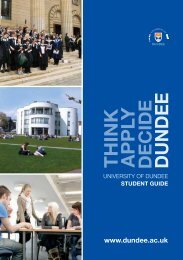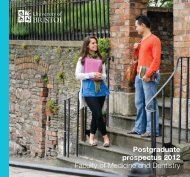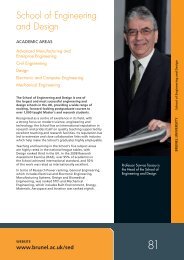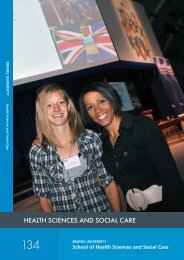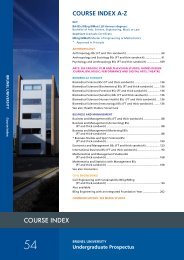Postgraduate Prospectus
Postgraduate Prospectus
Postgraduate Prospectus
Create successful ePaper yourself
Turn your PDF publications into a flip-book with our unique Google optimized e-Paper software.
Biological Sciences | www.essex.ac.uk/bs<br />
Sarah-Jane Walsh,<br />
Eastbourne, East Sussex<br />
– BSc Marine and Freshwater<br />
Biology ’09, PhD Marine<br />
Biology<br />
Student<br />
profile<br />
My PhD topic is fairly rare in the<br />
UK, due to research primarily<br />
being conducted in the tropics.<br />
When I saw that Essex had a title<br />
very close to the area I wanted<br />
to specialise in, I jumped at the chance to<br />
take it! I was also happy to conduct my<br />
postgraduate studies at Essex due to<br />
the University’s high research status in<br />
biological status and because of the<br />
notable scientists within the Department,<br />
who have helped to shape much of the<br />
subject I currently study. It is great to be<br />
able to work alongside these people and<br />
have their contributions in your publications.<br />
I have been lucky enough to be awarded<br />
full funding from the scientific body, NERC,<br />
and I receive funding for field research from<br />
Operation Wallacea, in return for my input<br />
into their own summer expeditions.<br />
I get to travel a lot with my research and<br />
recently attended an amazing course in<br />
Mexico with top researches in my field,<br />
which was great for expanding my<br />
background knowledge across<br />
disciplines, as well as getting to grips with<br />
a range of methodologies and instruction<br />
in the use of several commonly used<br />
scientific machinery. Conferences are<br />
also a fantastic opportunity to see what<br />
is at the forefront of your discipline and<br />
currently undergoing experimentation, as<br />
there is often a time lag between research<br />
being conducted and publication. It<br />
enables you to get a real feel for what<br />
is going on in your field, as well as being<br />
a good way to meet other students and<br />
possible collaborators.<br />
My fondest memories of studying at<br />
Essex will be the travelling opportunities<br />
it has given me, particularly intensive field<br />
courses where I underwent instruction<br />
from scientists at the forefront of my<br />
subject. And I will never forget the first<br />
time I met another student on<br />
a conference, who recognised<br />
my name from a publication.<br />
sufficiently qualified, you may be offered<br />
our MSD where, on satisfactory progress,<br />
you can be upgraded to our PhD.<br />
There are two entry levels to our PhD:<br />
n a good undergraduate degree – upper<br />
second class honours or above in an<br />
appropriate subject; or<br />
n an MSc in an appropriate subject.<br />
We offer structured training programmes<br />
which all must attend. These provide<br />
training in generic and key skills. You<br />
are expected to attend departmental and<br />
research group seminars, and give research<br />
seminars about your studies in research<br />
group meetings. A Departmental Graduate<br />
Forum, organised by our graduate students,<br />
is held each September and you present<br />
your research, either as a poster or an oral<br />
presentation, with prizes for the best. You<br />
are encouraged, and funded, to attend<br />
national and international conferences<br />
and, during the later stages of your PhD,<br />
expected to present your work at such<br />
conferences.<br />
You must attend two formal supervisory<br />
board meetings each year where you submit<br />
literature reviews and research reports to<br />
the Board members prior to the meeting.<br />
Your PhD thesis is generally completed<br />
within three to four years and has a<br />
maximum length of 80,000 words. Your<br />
MPhil is usually completed in two years,<br />
with a maximum length of 50,000 words.<br />
Your MSD is usually completed in one year,<br />
with a maximum length of 30,000 words.<br />
Our students are frequently employed<br />
as graduate laboratory assistants to<br />
act as demonstrators in undergraduate<br />
laboratory classes. Such teaching is a<br />
valuable experience for you.<br />
Research areas<br />
We offer research supervision within our<br />
different research groups. We also offer<br />
an interdisciplinary PhD Environmental<br />
Governance, which forms part of an<br />
accredited Doctoral Training Centre<br />
of the ESRC at Essex.<br />
Research supervision is available in the<br />
following areas:<br />
n Bacterial infections<br />
n Cancer biology<br />
n Environmental microbiology<br />
n Environmental plant biology<br />
n G-protein coupled receptors<br />
n Immunology<br />
n Marine and freshwater biology<br />
n Metalloproteins<br />
n Molecular mechanisms of<br />
tumourogenesis<br />
n Peptide interactions<br />
n Plant productivity<br />
n Protein molecular dynamics<br />
n Sustainable environments<br />
n Viral infections<br />
Doctor of Medicine<br />
Medically qualified staff at Essex, or at an<br />
NHS Trust associated with us, may apply<br />
for the degree of Doctor of Medicine. The<br />
minimum period of study and research is<br />
two years, and the maximum is four years.<br />
Please contact us for more details.<br />
74 | <strong>Postgraduate</strong> <strong>Prospectus</strong> 2012


